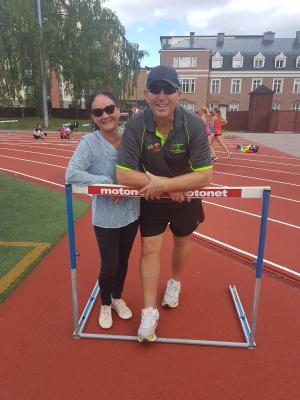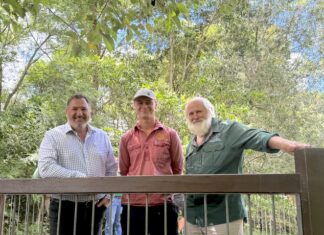Once again, the success of an Australian Olympic athlete,( this time AriarneTitmus) winning the gold medal, has bought to our attention, more so than ever, to the identity of the coach. Who will ever forget the over-the-top reaction, of coach Dean Boxall, ripping off his face mask, running back and forward in the stand and finally, grabbing the top rail and throwing his body back and forth? I am certain, that like a lot of Australians I was highly amused, maybe a little shocked, but definitely not offended.
Before those who would raise their voice in criticism get too loud, they should stop and think just what is involved in not only getting their athletes to the Olympics, but also having them mentally prepared to face the big one: the swim off for that elusive butterfly, the Olympic gold. To handle the pressure of all the different factors involved could also in some, be more painful than the physical factor of the event itself. However, the astute coach will recognise the signs and be able to utilise the emotions and use them as a plus. This, in coaching, is what separates the big achievers from the rest.
But for the coach, like the athlete, it just does not happen overnight. The journey will often start in a small country town, or as a member of a coaching staff in a big city club: wherever, the journey, is sure to be long and in some cases heartbreaking. The late guru of the International Noosa Tri Athlon Garth Proud once told me, “With the right people running this town it could easily become the sporting capital of Australia.”
When we stop and take a good, look at the raw talent, plus state and national (in most cases unknown) achievers we have within this community, the words really make one stop and think. This then, of course, brings us to the coaches.
One of the many who have been successful coaching in our community is Mick Hooper, head coach Noosa Athletics. Over the years he has collected many achievements but there are three years that really stand out. In 2014 Jordan Csabi won the Australian U/18 men’s 200m and was selected to represent Australia at the Youth Olympic Games, Nanjing China, where he finished 10th. Then came 2016. Samantha Stanley won the Australian U/17 women’s 100m, 200m and triple jump: then finished the year by becoming the first female winner of the famous Noosa Gift 110m professional sprint.
The year 2018 saw Zane Branco win the Australian U/20 men’s 200m and Samantha Johnson third in the U/20 women’s 100m hurdles (world junior qualifying time of 13.76). Then in July, both Zane and Samantha went on to represent Australia in the World Junior Athletics Championships in Tampere Finland. With teams from 180 countries competing, the competition could not have been tougher.
A blanket finish had Zane fifth in the final of the 200m and Samantha making the semis in the 100m hurdles. She then backed up to run a leg in the 4x100m relay final: finishing seventh they broke the Australian record.
These outstanding achievements, both at Australian and international level, speaks volumes for unknown coaches of our Noosa Athletics. “Like all athletes, there comes a time when they must sit with us and decide on their future: to become dedicated, committed and aim for the Olympics, or just stay local and enjoy the sport. It’s their decision,” said coach Hooper.
To prepare them for the long journey to the Olympics, or the top of the ladder in other sports, with its many ups and downs, the role of the coach is of the utmost importance.
This year is the third time that Coach Hooper, has been awarded the Frank Knight Memorial Trophy as the Coach of the Year for Little Athletics Queensland. The fact that his wife Val, has, for many years, been a member of the board for Athletics Queensland, would have played a major support role in his success as a coach. Well done to both.
For Bryan Dukas, chief instructor of the Shotokan Karate and Fitness Institute, based on Gibson Road Noosa, the month of July will certainly be a month to remember. His results and ability as a coach were further recognised when, during the month, he was appointed Queensland Head Karate Kata Coach from 2021 until further notice.
Prior to this, news came from Japan that the WSKF (World Shotokan Karate Federation), of which the Noosa club is now a charter member. Two students, Kimberly Bateman and Morney Plescia, both black belt members, had the results of their recent examinations, accepted and approved. This now entitles both to be officially acknowledged as holders of Black Belt 3rd Dan.
This is indeed an outstanding achievement, one in which the club can take great pride. For this high grading, all results have to be forwarded to Japan where they are officially scrutinised for approval. The results are then returned to the Noosa club where they are officially announced by chief instructor Bryan Dukas 6th Dan. The results are indeed a good indication as to the high standard of coaching that is available within the club: for parents, whose kids are starting out as a novice, they can rest assured that they are in good hands.
The immediate responsibility for the new head coach (and his support team), will be the preparation for the national titles to be held in Melbourne September 17-19: health regulations permitting. This will necessitate the setting up of coaching clinics and seminars with the Queensland state team. Modern technology enables Sensei Dukas to work remotely with areas such as Cairns and Rockhampton. Also on the agenda, is the need to draw up a two-year development plan to improve Queensland karate standards.
Now in his sixth year as chief instructor, the results have been outstanding with students winning championships at both state and national levels. Then 2019 became the big year when team members won gold at the World Shotokan Championships in Tokyo: a highlight of which was Cooroy’s 13-year-old Dannica Starkey, Black Belt, winning the gold medal for Kumite (sparring) in her junior division.
“A coach,” said Bryan, “will invest many hours into a student to get them ready for major tournaments, often working outside normal class times and training programs. Most important, is learning the mental attitude and working with a karate mindset. However, we must remember, a coach is only as good as his athletes.”
For this coach, a major factor in the clubs’ success, has been the loyal support of his coaching panel: Tammy Kelly and Rick Hislop, both 5th Dan.
For Bryan, with his family of wife Anita, daughter Mikayla 12 and son Brandon 10, plus his added responsibilities as state head coach, his life is full on. However, regarding his children, he is now very proud that both have decided to join the club and commence training. This could be the start of a possible third generation in the sport as Bryan and his two brothers, Warren and Dylan, all commenced their careers under the guidance of their father, the now legendary Mike Dukas 8th Dan of South Africa. Father Mike, who still lives in South Africa is working around South Africa and Nambiar as an instructor while at the same time, fulfilling his international duties as vice- president of World Shotokan Karate Federation. We wish them well.
Next week we pay our respect to other coaches who have, and still are, making an outstanding contribution to sport in our community










